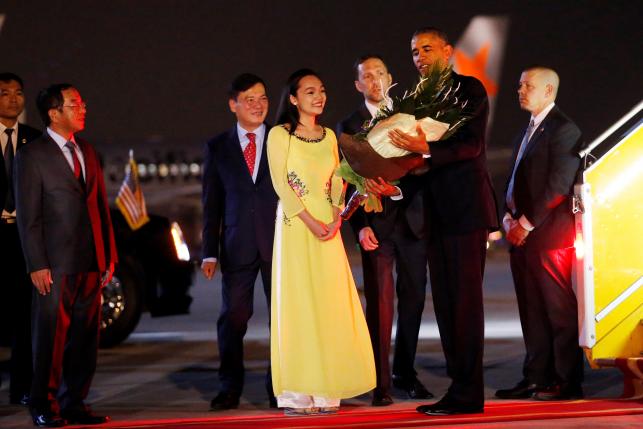Arms embargo on Vietnam in the balance as Obama visits old foe

HANOI - US President Barack Obama began his first visit to Vietnam on Monday, a trip aimed at sealing a partnership with America's former enemy and part of his strategic "rebalance" toward Asia to counter China's growing strength in the region.
Four decades after a war that deeply divided opinion in America, Obama will press for stronger defense and economic ties with the country's communist rulers but prod them too on human rights, aides say.
The president's three-day stay is unusually long for one country, underscoring the importance he places on expanding relations with Hanoi. Ahead of the visit, pressure mounted on him to roll back an arms embargo, one of the last vestiges of wartime animosity.
Such a step would anger Beijing, which resents US efforts to forge stronger military bonds with its neighbors amid rising tensions in the disputed South China Sea.
US officials were finalizing a decision on the issue as Obama landed in Hanoi late on Sunday.
Most top aides favor at least easing the ban, arguing that Washington needs to demonstrate tangible support for Hanoi's efforts to build its deterrent against China, people familiar with the discussions said.
Obama's visit follows what the Pentagon called an "unsafe" intercept last week by Chinese fighter jets of a US military reconnaissance plane over the South China Sea.
"Nobody has any illusions," said Evan Medeiros, Obama's former top Asia adviser. "This trip sends important signals to China about US activism in the region and growing US concern about Chinese behavior."
But Vietnam's human rights record is a sticking point.
Officials are mindful of misgivings back in Washington about losing leverage for securing political reforms from a government that rights advocates say is among the world's most repressive.
Any move to revoke the ban – something Vietnam has long sought - would make clear that every weapons sale would be on a case-by-case basis, contingent on human rights considerations, officials said.
Obama, who has proven himself a pragmatist in balancing security and human rights, appeared to be trying to keep the pressure on Hanoi for concessions up to the last minute.
He plans to meet dissidents during his trip.
But officials are looking not only for signs that the Vietnamese are taking rights concerns seriously. They want a clear commitment to expanded military cooperation, including more US access to ports such as the strategic Cam Ranh Bay and participation in joint and regional naval exercises.
Obama, the third US president to visit Vietnam since diplomatic relations were restored in 1995, has made closer diplomatic and military cooperation with countries across the Asia-Pacific a centerpiece of his foreign policy. -Reuters







